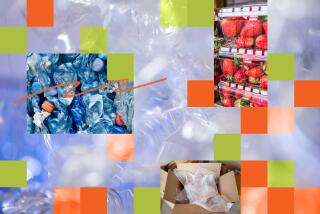Food waste prompts most green guilt, survey says
- Share via
Throwing a half-eaten hamburger in the trash is more likely to prompt consumer guilt than watering a lawn, according to a study to be released Thursday. The Eco Pulse survey from marketing communications firm Shelton Group found that 39% of Americans felt the most green guilt for wasting food.
The fifth annual survey polled 1,013 Americans and found that consumers also felt guilty about leaving the lights on when leaving a room (27%), wasting water (27%), failing to unplug chargers for electronics (22%), not recycling (21%) and forgetting to bring reusable bags to the store (20%). They felt the least guilt about not buying energy-efficient light bulbs (9%), not sticking to an energy-efficient thermostat setting (7%), not being careful about how long or when they watered the lawn (6%) and using chemical lawn or plant fertilizers (6%).
“Guilt can be a powerful motivator to get you off your back side to do the right thing,” said Shelton Group Chief Executive Suzanne Shelton, who works with companies and organizations to develop strategies that promote sustainability. “We wanted to understand if there is green guilt and what are the things consumers feel guilty about.”
Shelton Group, based in Knoxville, Tenn., is studying how to motivate consumers to change their behavior.
“We know that telling people to save the planet does not work. The vast majority of Americans don’t care,” said Shelton, who added that the best way to reduce food waste probably isn’t to remind people how much it’s costing the planet, or even their pocketbooks.
More than 300 million barrels of oil are unnecessarily used in the production of wasted food, and on average that food costs a U.S. family $600 a year, she said. But consumers are more likely to be motivated by “solutions that offer a get-out-of-guilt-free card,” such as text messages that remind them to use their tomatoes and provide recipes, or public service announcements that suggest they map out their menus and take leftovers to work.
Guilt over food waste stems from cultural mores as well as good intentions gone awry, Shelton said.
“A mom goes to the grocery store, buys all this great food to feed her family well, and life gets in the way,” Shelton said. “Soccer practice runs long, and it’s easier to pick up a pizza, so by the end of the week, she’s throwing out all the spoiled food from the refrigerator.”
Women, Shelton added, reported feeling far more guilt than men about wasting food, using paper towels, buying cleaning products with strong chemicals, eating meat and other behaviors. Consumers who earn $75,000 to $99,999 per year felt more guilt than others about wasting food, whereas those earning $100,000 or more were more likely to say the felt no guilt at all.
Senior citizens felt the least guilt about not recycling, and 18- to 24-year-olds felt the most guilt about taking long showers.
Shelton said the recent study showed low levels of guilt about water-wasting behaviors such as running a partially full dishwasher or clothes washer -- a contrast with studies conducted in the previous three years. Those studies consistently found that two-thirds of the population feels “personally responsible” for conserving water and “very concerned” about ongoing access to clean water. If consumers don’t feel guilty about wasting water, Shelton said, they can’t be guilted into conserving it.
“The trick is how to work with guilt in a way that isn’t nefarious,” she said. “If consumers feel guilty, they want to not feel guilty, so how do we give them a solution? Guilting them into doing something won’t create sustainable behavior change.”


